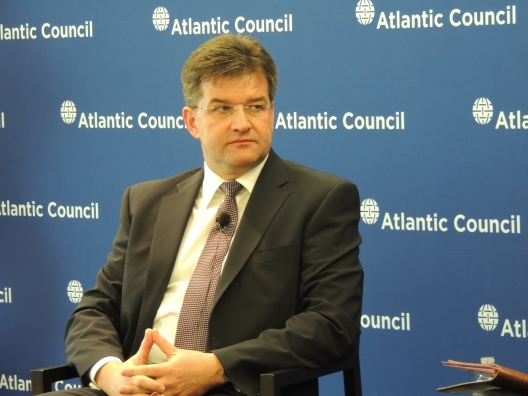 On November 5, Miroslav Lajčák, Deputy Prime Minister and Minister of Foreign and European Affairs of the Slovak Republic, was the featured speaker at the Atlantic Council’s event, EU’s Eastern Partnership: The Vilnius Summit and Beyond. Minister Lajčák’s visit to Washington comes only three short weeks before the European Union (EU) and the six former Soviet countries designated as “eastern partners” convene in Vilnius, Lithuania at the third Eastern Partnership Summit.
On November 5, Miroslav Lajčák, Deputy Prime Minister and Minister of Foreign and European Affairs of the Slovak Republic, was the featured speaker at the Atlantic Council’s event, EU’s Eastern Partnership: The Vilnius Summit and Beyond. Minister Lajčák’s visit to Washington comes only three short weeks before the European Union (EU) and the six former Soviet countries designated as “eastern partners” convene in Vilnius, Lithuania at the third Eastern Partnership Summit.
Additional ContentWatch the full video from the EU’s Eastern Partnership: The Vilnius Summit and Beyond event |
Despite the EU’s stated desire to sign an association agreement with Ukraine and to make progress on further agreements with other partners (Moldova and Georgia), the run up to the summit has been fraught with controversy and uncertainty over the EU’s continuing relationship with each of the partner countries.
Minister Lajčák underscored several important points in his speech when he said that the link between Europe and its partners should be based on the EU’s ability to “attract and inspire,” and not on any political demands placed on the partner countries. Implicit in this statement is an admonition of the significant pressure Russia has been exerting on the countries in its former sphere of influence to join its own competing Customs Union rather than formalize any agreements with the EU.
The simple fact is that Russia’s Customs Union is not compatible with the association agreements drawn up by the EU. The countries of the Eastern Partnership must make a choice to pursue further integration into Europe, or to reinforce their historical ties with Russia. It would be ill-advised, however, for the EU to be drawn into an “either us or them” scenario. If the upcoming summit is to be successful in cementing the partnerships between the EU and these countries, any formal decisions must be made out of mutual interest and free from outside pressure.
Minister Lajčák’s point is made clearer in the context of the Tymoshenko controversy that has threatened to derail Ukraine’s negotiations at the summit. While not an official item on the summit agenda, the issue of selective justice, with imprisoned Ukrainian politician Yulia Tymoshenko as the symbol of politically-motivated prosecution, has been brought to the forefront of the Eastern Partnership discussions over and over again.
The EU has made clear that there is little chance of an EU-Ukraine signed agreement at the summit as long as Tymoshenko remains in prison in Ukraine; yet there is still no European consensus on how to respond to the problem. Some EU member states have questioned whether the possible release of Tymoshenko is enough to prove that Ukraine is acting in good faith to reform its justice system. They stress that Ukrainian President Viktor Yanukovych should release Tymoshenko as a result of a value-based judgment and not merely for political motivations.
If the EU hopes to convince its partners to further their integration in Europe without exerting pressure on par with Russian tactics, it must stand strong on issues like selective justice that the EU finds important. The last thing the EU should do is hastily initial an agreement if it means compromising on the basic values and rule of law to which the EU adheres.
If any lesson can be taken from the discussion on Tuesday, it is that the challenges faced by the EU in developing a deeper relationship with the eastern partners are not quick fix issues. There can be no one size fits all approach to the Eastern Partnership for the EU. As Minister Lajčák matter-of-factly stated, “We must respect each other and the decisions of our partners,” no matter what those decisions may be.
Although the EU will be tempted to accept short term solutions to the problems outlined above in order to make the demonstrable progress everyone is expecting at the summit in Vilnius, it is important for the EU to consider the long term effects of the process. After the summit, one of the greatest challenges may be to simply keep the issues relevant. The EU must make it a priority to prevent the Eastern Partnership from falling out of the spotlight, as tends to happen once the media moves on to the next big event. Finally, the EU’s focus in the region will ideally shift from negotiation of agreements towards implementation of the agreements that result from the meetings. The partner countries will need continued support in the transition to integral members of the European neighborhood and market, and the EU needs to take the lead on this. The EU will no doubt continue to encounter challenges in its relationship with the eastern partners, but the current trend towards increased cooperation is certainly a positive one.
Sarah Bedenbaugh is an intern with the Transatlantic Relations Program.
